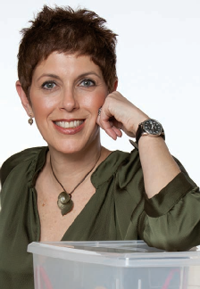![]() Hoarding specialist Leslie Josel '85 helps clients cope with extreme clutter
Hoarding specialist Leslie Josel '85 helps clients cope with extreme clutter
Hoarding specialist Leslie Josel '85 helps clients cope with extreme clutter
There was the family whose house was so overstuffed, they had to enter it by climbing an eight-foot ladder to reach a window—and slept in a tent in the backyard. There was the compulsive shopper who bought four houses next to each other to hold all his belongings. Then there are the "sentimental hoarders"—the kind who keep everything from baby clothes to the ugly vase they got as a gift twenty years ago—and the "intellectual hoarders" who hold onto every newspaper, magazine, and piece of mail on the off chance they may need it someday. This isn't the lineup for the new season of TLC's "Hoarding: Buried Alive"; it's Leslie Josel's career.

The former human development major is a professional organizer specializing in clients with chronic disorganization and hoarding behaviors. Her Westchester-based business, Order Out of Chaos, serves clients throughout the tri-state area. About a third of them are teenagers needing help with ADD-related issues or time management, another third are adults who hoard, and the rest suffer from compulsive disorganization. Josel '85 generally handles the more severe cases, while the more straightforward jobs are passed on to the three organizers she employs; her firm also has a moving and downsizing division.
A former human resources executive, Josel founded Order Out of Chaos a decade ago after her son was diagnosed with ADD and learning disabilities. She searched for ways to "untangle" his environment, and soon found that others wanted her to organize their homes. While Josel did not initially treat hoarding, she realized there was a growing market for such specialists and sought certification from the Institute for Challenging Disorganization, the field's nonprofit professional group. Since then, popular interest in the disorder has grown significantly, with numerous media stories about hoarding cases and two reality TV shows on the topic, "Hoarding: Buried Alive" and A&E's "Hoarders." Josel, who has worked with both shows and appeared on "Buried Alive," believes that public interest has helped sufferers by giving the problem a real diagnosis. "It's brought the clutter out of the closet," she says. "Everyone used to joke about the crazy lady in the house with the cats, but now they've humanized it." Still, Josel predicts that such behaviors will continue to increase, fueled in part by our consumer-oriented society. She has even begun working with children who hoard, including a young boy who keeps 1,000 boxes in his room, forbidding anyone from touching them. "We are a disposable generation," Josel says, "yet some of us don't dispose."
One of Josel's current clients is Robert Stein, a successful New York lawyer who asked that his real name be withheld. Stein is a compulsive buyer, with many collections—from stamps to coins to cartoon memorabilia—and hoarding tendencies. For the past year and a half, he has been working with Josel to cut back on his buying and get rid of some of his collections. "It's been highly successful, but it's not done," he says. "We're still learning and making progress." During their twice-monthly meetings, he and Josel determine that day's goals; she often pushes Stein to rank his possessions on a scale of one to ten, one of her most common strategies. "You learn that you do have a finite amount of time for stuff," he says. "If you cut back, maybe you can have more time for family if, rather than going on a shopping trip, you spend the time throwing a ball around. It's been eye-opening."
Josel stresses that it is often crucial to involve families and therapists in the healing process—and that while some people may think hoarding can be easily curbed, treatment can be lengthy. "It is a disease, a real disorder," she says. "People need therapy, support, and someone in the trenches with them." As Josel often puts it: "Clutter is like another member of the family— and it's the most dysfunctional member."
— Natanya Auerbach '13
{youtube}XiafdkzpbeE{/youtube}
Leslie Josel on Hoarding: Buried Alive (3:22)


